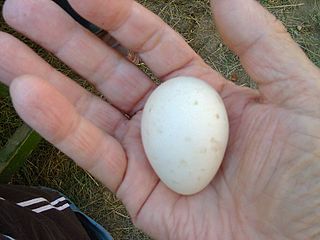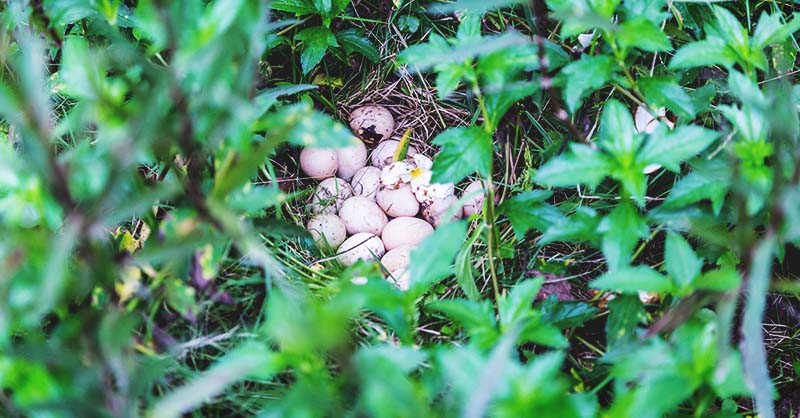With so many different bird species on the planet, it’s a wonder that most people have only tasted one or two varieties of eggs.
According to the American Egg Board, 157.6 million dozen chicken eggs were sold retail in 2018.
So, it’s no secret, Americans love eggs, and if you’d like a profitable egg, you shouldn’t overlook Guinea Fowl eggs. Read on to learn more about the wacky loud-mouthed bird and how you can bring extra income to your farm.

What is a Guinea Fowl?
When you first see a Guinea Fowl, you’ll be amazed by their contrasting colors, wing-like wattles, and mime-ish makeup. These birds have character, and they do have a lot to say if they are displeased, which is also why they get a bit of a bad reputation.
Guinea fowl love to squeak and squawk to alarm each other of impending doom – usually a neighbor walking their pug, for example.
Regardless of their dramatic antics, amusing features, and chalkboard-like screeching, Guinea fowl are fantastic watchdogs, incredible pest control, and functional egg layers.
Let’s take a closer look at Guinea Fowl eggs and give this misunderstood fowl a well-deserved shout-out for all their hard work.
What Do Guinea Fowl Eggs Look Like?

Guinea fowl eggs aren’t all that different in appearance from chicken eggs. They’re a bit smaller and can have a stout-like appearance: pointier on the pointy end than a chicken egg.
Typically, Guinea eggs are brown to light brown and speckled with dark brown spots.
If you let guinea hens free-range, which they appreciate, you will probably have to hunt for their eggs. They tend to lay them in a communal nest amongst the weeds.
Guinea eggs are not available year-round, so don’t expect to have these nutritious nuggets mid-winter. These birds lay eggs only a few times a year, stock up a clutch of eggs, and hatch the keets (baby guinea fowl) and raise them together.
It is not uncommon to see a couple of hens taking care of a large clutch of keets.
Guinea eggs are entirely edible and very rich in flavor and texture…in a delicious way!
Compared to a chicken egg, there is much more yolk than egg white in a guinea egg, and contrary to popular belief, guinea eggs do not taste gamey.
How Do Guinea Fowl Eggs Compare to Chicken Eggs?

Not to disappoint, guinea fowl eggs taste pretty similar to chicken eggs with just a few other differences:
1. Guinea Eggs are Richer and Creamier Than Chicken Eggs
Guinea eggs are creamier than chicken eggs because of the higher yolk to egg white ratio. Yolks are the densest part of an egg, so the cooked product will undoubtedly be heftier than if there were less yolk.
2. Orange Yolk
This difference is a little unfair because Guinea fowl eggs are not necessarily more orange than chicken eggs; however, they probably appear that way based on the way they are raised.
For example, chicken eggs purchased in the store are raised commercially and not typically free-ranged. Store-bought eggs will not be as fresh as an egg plucked from a morning nest. Guinea hens are excellent foragers, and not generally raised commercially. And that’s how you know they are fresh!
If you free-range or raise chickens, you won’t notice much difference in the color of the yolks when side-by-side. In fact, you can trick guests with a guinea fowl egg salad sandwich, and they probably won’t know it wasn’t made from chicken eggs.
4. Nutritional Value
Two guinea eggs are nutritionally more valuable than a single chicken egg from the grocery store, but again, this has to do with how the birds are raised. Guinea eggs are incredibly high in protein and have a fair amount of fat due to their ability to forage for high-protein foods like insects and grubs.
It’s a horse a piece when it comes down to nutritional value, but those who eat guinea eggs swear they are tastier and creamier. With a higher (healthy) fat content and rich in protein, these contribute to the better taste.
Where Can I Get Guinea Eggs?
Depending upon where you live, guinea eggs may be hard to come by. If you live in the city, or a suburban area, there may be ordinances restricting ownership of these loud birds. It might be hard to find a neighbor with eggs on hand.
If you don’t know someone with Guinea fowl, your options will probably be limited to the following:
1. Farmer’s Markets
As you might have guessed, you can’t go to the local grocery store to buy a dozen Guinea Fowl eggs. Your best bet is to check out your local farmer’s markets for small farmers who raise these clownish birds.
2. Raise Your Own
I’m guessing that if you are reading this article, you’re probably interested in raising your own guinea hens. Lucky for you, fresh eggs will arrive within a year of obtaining your hens (if you can find the nest)!
Hens lay seasonally, so if you live in a warm, dry climate, the laying season will last longer than if you lived in a cold climate. Guinea fowl are initially from Africa, and they like warm environments even though they thrive in cold weather as well.
Making Money with Guinea Fowl Eggs
1. Farmer’s Markets
Since Guinea Fowl eggs tend to be hard to come by, they fetch a premium price at the farmer’s market. So if you are looking to make some extra cha-ching from your goofy guineas, selling their eggs may turn out to be quite lucrative for your homestead.
2. Chicks
In the same way you started with your venture, there are other homesteaders who may want to start keeping Guinea Fowl, and want to purchase hatchlings to rear.
3. Restaurants
It is rumored that they are seen as a delicacy by some, so approach restaurants focussing on French on Oriental cuisine to supply them directly with this much sought-after food ingredient.
What to Charge for Guinea Eggs
While fresh, free-range, chicken eggs demand top dollar, rare Guinea eggs can be priced much higher.
Depending upon your location, a dozen, farm-fresh, chicken eggs will go for anywhere from $3-$5.
Now, think about the rarity of Guinea eggs, and their shortened laying season.
Oh, and don’t forget the work you’ve put into gathering their expertly hidden eggs.
When all is said and done, you can easily charge $1 per egg using those exact selling points–not to mention the creamy-delicious flavor and texture.
How Many Guinea Hens Should I Raise?
The number of hens you should keep depends upon your local market. Since you’re starting with a small flock of Guinea fowl, you can test the market with family and friends. Word of mouth travels fast, so if your eggs are a hit, you will have more takers before you know it.
From there, head to farmer’s markets, fairs, and flea markets to market your eggs.
Once you get a recurring customer base, you will be able to gauge how many hens you need to meet demand. Remember, Guinea Hens do not lay year-round. You can plan to harvest around 100 eggs per hen during the laying season.
What Permits and Licenses Do I Need To Sell Guinea Eggs?

Like most products sold for human consumption, the sale of guinea eggs is regulated for consumer safety reasons.
Check with your county, state, and the USDA to ensure that you are following regulations. There may be permits needed to sell your eggs legally. Don’t get caught without the proper documentation.
Each county and state has its own regulations that you must adhere to in order to sell your eggs legally. Some states may allow the sale of eggs, directly from your farm to the consumer, without a permit.
Please do your due diligence when selling your eggs. One wrong move can be a costly mistake for your wallet, and reputation,
If you’re thinking of getting a Guinea Fowl flock simply for pest control, you will be pleasantly surprised with their rich and creamy eggs. However, even more exciting, is the amount of money they can bring to your homesteading operation.
Yes, there is more than meets the eye when it comes to the Guinea hen, and their eggs are definitely something to appreciate!













